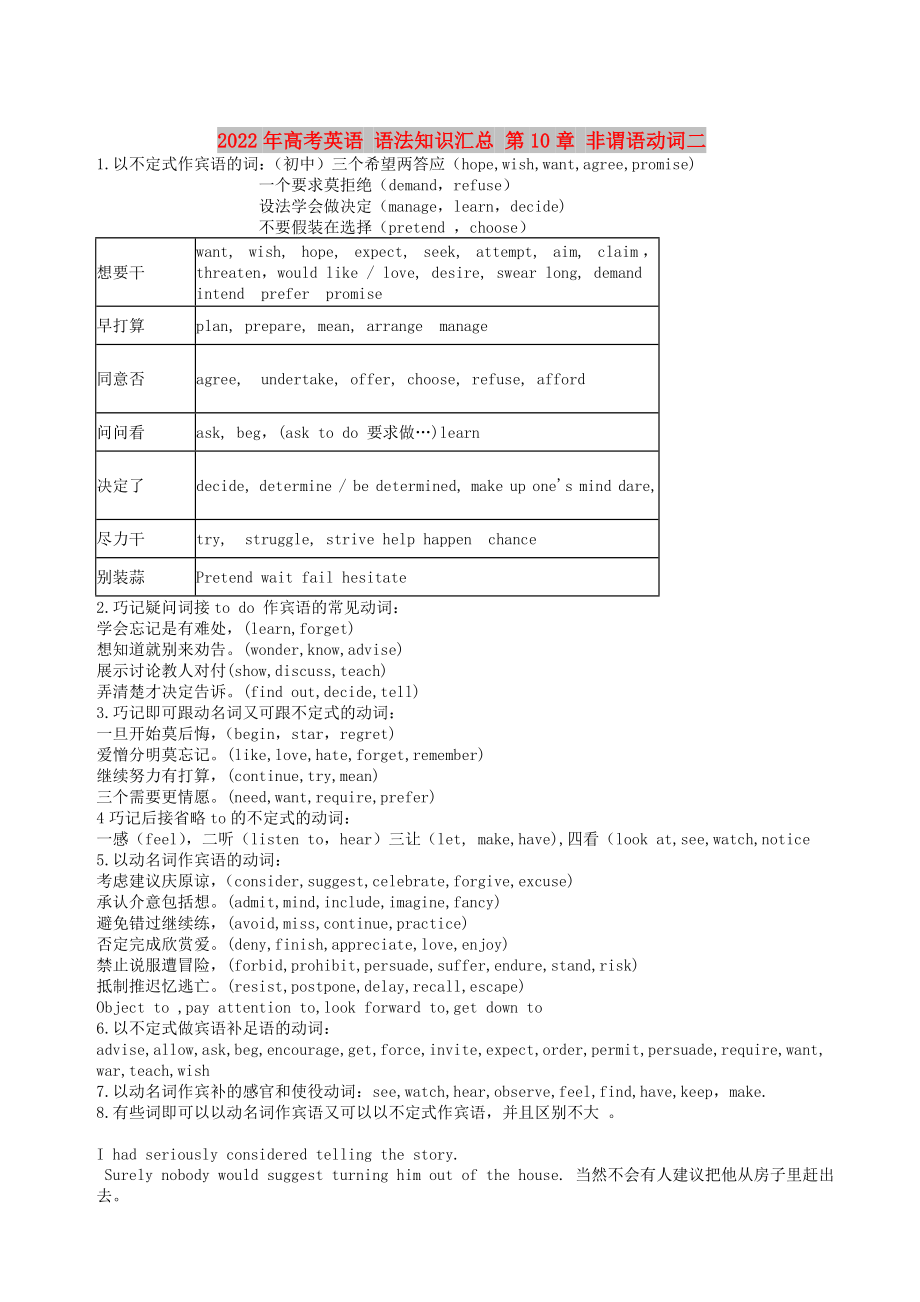《2022年高考英語(yǔ) 語(yǔ)法知識(shí)匯總 第10章 非謂語(yǔ)動(dòng)詞二》由會(huì)員分享��,可在線閱讀��,更多相關(guān)《2022年高考英語(yǔ) 語(yǔ)法知識(shí)匯總 第10章 非謂語(yǔ)動(dòng)詞二(3頁(yè)珍藏版)》請(qǐng)?jiān)谘b配圖網(wǎng)上搜索��。
1��、2022年高考英語(yǔ) 語(yǔ)法知識(shí)匯總 第10章 非謂語(yǔ)動(dòng)詞二
1.以不定式作賓語(yǔ)的詞:(初中)三個(gè)希望兩答應(yīng)(hope,wish,want,agree,promise)
一個(gè)要求莫拒絕(demand��,refuse)
設(shè)法學(xué)會(huì)做決定(manage��,learn��,decide)
不要假裝在選擇(pretend ��,choose)
想要干
want, wish, hope, expect, seek, attempt, aim, claim��, threaten��,would li
2��、ke / love, desire, swear long, demand seem intend prefer promise
早打算
plan, prepare, mean, arrange manage
同意否
agree, undertake, offer, choose, refuse, afford
問(wèn)問(wèn)看
ask, beg��,(ask to do 要求做…)learn
決定了
decide, determine / be determined, make up one's mind dare,
盡力干
try, struggle, strive
3��、 help happen chance
別裝蒜
Pretend wait fail hesitate
2.巧記疑問(wèn)詞接to do 作賓語(yǔ)的常見(jiàn)動(dòng)詞:
學(xué)會(huì)忘記是有難處��,(learn,forget)
想知道就別來(lái)勸告��。(wonder,know,advise)
展示討論教人對(duì)付(show,discuss,teach)
弄清楚才決定告訴��。(find out,decide,tell)
3.巧記即可跟動(dòng)名詞又可跟不定式的動(dòng)詞:
一旦開(kāi)始莫后悔��,(begin��,star��,regret)
愛(ài)憎分明莫忘記��。(like,love,hate,forget,remember)
繼續(xù)努力有打算
4��、��,(continue,try,mean)
三個(gè)需要更情愿��。(need,want,require,prefer)
4巧記后接省略to的不定式的動(dòng)詞:
一感(feel)��,二聽(tīng)(listen to��,hear)三讓?zhuān)╨et, make,have),四看(look at,see,watch,notice
5.以動(dòng)名詞作賓語(yǔ)的動(dòng)詞:
考慮建議慶原諒��,(consider,suggest,celebrate,forgive,excuse)
承認(rèn)介意包括想��。(admit,mind,include,imagine,fancy)
避免錯(cuò)過(guò)繼續(xù)練��,(avoid,miss,continue,practic
5��、e)
否定完成欣賞愛(ài)��。(deny,finish,appreciate,love,enjoy)
禁止說(shuō)服遭冒險(xiǎn),(forbid,prohibit,persuade,suffer,endure,stand,risk)
抵制推遲憶逃亡��。(resist,postpone,delay,recall,escape)
Object to ,pay attention to,look forward to,get down to
6. 以不定式做賓語(yǔ)補(bǔ)足語(yǔ)的動(dòng)詞:advise,allow,ask,beg,encourage,get,force,invite,expect,order,permit,
6��、persuade,require,want,war,teach,wish
7. 以動(dòng)名詞作賓補(bǔ)的感官和使役動(dòng)詞:see,watch,hear,observe,feel,find,have,keep��,make.
8. 有些詞即可以以動(dòng)名詞作賓語(yǔ)又可以以不定式作賓語(yǔ)��,并且區(qū)別不大 ��。
I had seriously considered telling the story.
Surely nobody would suggest turning him out of the house. 當(dāng)然不會(huì)有人建議把他從房子里趕出去��。
She celebrate her passing t
7��、he exam.
You could forgive my insulting you. 你原諒我對(duì)你的侮辱��。
第一節(jié)分詞作定語(yǔ):用現(xiàn)在分詞或過(guò)去分詞修飾名詞或代詞��。
1. Who is the man standing there.
2.this is the book written by LuXun.
3.look the broken window.
4.That is a sleeping boy.
句子1��,現(xiàn)在分詞短語(yǔ) standing there做man的后置定語(yǔ)��;句子2��,過(guò)去分詞短語(yǔ)written by LuXun 做book的后
8��、置定語(yǔ)��;
句子3��,過(guò)去分詞broken 做window 的前置定語(yǔ)��;句子4.現(xiàn)在分詞sleeping做名詞boy的前置定語(yǔ)��。
規(guī)律一:分詞做定語(yǔ)的位置 分詞短語(yǔ)--后置定語(yǔ)��;分詞--前置定語(yǔ)
分詞的作用:相當(dāng)于定語(yǔ)從句
1. Who is the man that is standing there.
2.this is the book which was written by LuXun.
3.look at the window which is broken .
4.That is the boy who is sleeping.
9��、 主動(dòng)與被動(dòng)的關(guān)系:
主動(dòng):分詞與被修飾的名詞是主謂關(guān)系
被動(dòng):分詞與被修飾的名詞是動(dòng)賓關(guān)系
二��、 分詞做定語(yǔ)的時(shí)間
Doing (表示任一時(shí)間或同時(shí))��,表示主動(dòng)��,表示進(jìn)行��。如:
The man giving us a talk yesterday.
Who is the man standing there.
The room facing south.
Done (忽略時(shí)間或在謂語(yǔ)動(dòng)詞動(dòng)作之前)表示已經(jīng)完成��,表示被動(dòng)��。
I go to see the man operated on yesterday.(非謂語(yǔ)動(dòng)詞的動(dòng)作發(fā)生在謂語(yǔ)動(dòng)詞see之前}
I go t
10��、o see the man being operated on now.(非謂語(yǔ)動(dòng)詞的動(dòng)作發(fā)生在謂語(yǔ)動(dòng)詞see同時(shí)}
I go to see the man to be operated on tomorrow.(非謂語(yǔ)動(dòng)詞的動(dòng)作發(fā)生在謂語(yǔ)動(dòng)詞see之后}
分詞做定語(yǔ)總結(jié): 主動(dòng):doing (任意時(shí)間)
分
詞
做
定
語(yǔ) done 謂語(yǔ)動(dòng)詞之前
被動(dòng)
Being done 謂語(yǔ)動(dòng)詞同時(shí)
11、
分詞的完成式不作定語(yǔ) To be done謂語(yǔ)動(dòng)詞之后
第二節(jié) 分詞作狀語(yǔ)
同時(shí)
doing (任意時(shí)間)現(xiàn)在分詞一般式
主動(dòng): 方式原因條件伴隨等
Having done 謂語(yǔ)動(dòng)詞之前
分
詞
做
狀
語(yǔ) done 方式
12��、原因條件伴隨等
被動(dòng)
Being done 謂語(yǔ)動(dòng)詞同時(shí)(正在被)
Having been done謂語(yǔ)動(dòng)詞之前(已經(jīng)被)
例句:Singing and dancing,he came in.
Having finished his homework,he went to bed.
Being built ,the school is in a mass.
Having been told the news.,he went to the hospital.
13��、
1. Followed by 6 students ,he came in. ( √ )
2. Being followed by 6 students ,he came in. ( × )
3. Having been followed by 6 students ,he came in. ( × )
Followed表示方式��,沒(méi)有強(qiáng)調(diào)時(shí)間的先后��,不用說(shuō)“正在被跟隨”還是“已經(jīng)被跟隨”��; done表示方式��,原因��,條件��,伴隨等等��,不強(qiáng)調(diào)先后順序��,而B(niǎo)eing done 和having done 在作定語(yǔ)時(shí)只表示謂語(yǔ)動(dòng)詞與非謂語(yǔ)動(dòng)詞的時(shí)間先后��。
 2022年高考英語(yǔ) 語(yǔ)法知識(shí)匯總 第10章 非謂語(yǔ)動(dòng)詞二
2022年高考英語(yǔ) 語(yǔ)法知識(shí)匯總 第10章 非謂語(yǔ)動(dòng)詞二

